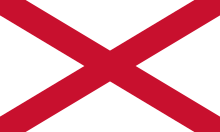English-Irish

St Patrick's Cross is often seen as a symbol of the Anglo-Irish
|
|
| Regions with significant populations | |
|---|---|
| Ireland | |
| Languages | |
| Standard English, Hiberno-English | |
| Religion | |
|
Anglicanism (some Methodist or other Protestant) (see also Religion in Ireland) |
|
| Related ethnic groups | |
| English, Irish, Ulster Scots, Welsh, Scots |
Anglo-Irish (Irish: Angla-Éireannach) is a term which was more commonly used in the 19th and early 20th centuries to identify a social class in Ireland, whose members are mostly the descendants and successors of the English Protestant Ascendancy. They mostly belong to the Anglican Church of Ireland, which was the established church of Ireland until 1871, or to a lesser extent one of the English dissenting churches, such as the Methodist church, though some were also Catholic. Its members tended to follow English practices in matters of culture, science, law, agriculture and politics but often defined themselves as simply "Irish" or "British", rather than "Anglo-Irish" or "English". Many became eminent as administrators in the British Empire and as senior army and naval officers.
The term is not usually applied to Presbyterians in the province of Ulster, whose ancestry is mostly Lowland Scottish, rather than English or Irish, and who are sometimes identified as "Ulster-Scots". The Anglo-Irish held a wide range of political views, with some being outspoken Irish Nationalists, but most overall being Unionists. And while many of the Anglo-Irish were part of the English diaspora in Ireland, some were of native Irish origin in part and Catholic but had converted to Anglicanism.
...
Wikipedia
